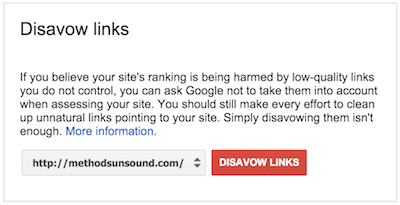Should you audit your disavow file?
When should site owners initiate an audit of their disavow file, and how can they effectively execute this process to appease Google and improve their search ranking?
When should site owners initiate an audit of their disavow file, and how can they effectively execute this process to appease Google and improve their search ranking?
In October 2013, Google gave us the Disavow tool.
This allowed webmasters to instruct Google not to count the link metrics that flowed either through certain links or from certain domains.
If you’ve had a manual penalty or have been dealing with Google’s Penguin algorithm, you’ve probably filed a disavow file.

For the last two years, I have reviewed a large number of disavow files, which often harm sites’ rankings. In some cases, I have suggested auditing the disavow file to determine whether it should be modified and resubmitted.
Here are some possible scenarios in which a site owner may make the decision to thoroughly review their disavow file.
Some link auditing tools can be quite helpful when it comes to organizing your links. But it is vitally important that you take this well-organized list and manually review the disavow suggestions the tool has made.
I have seen far too many businesses blindly take the report generated from one of these tools and submit it directly to Google. Usually when this happens, a large number of unnatural links go undetected and are not disavowed.
Viewing the backlink profile for a site that had relied on an automated tool for disavow decisions recently, I discovered unnatural links from 965 new domains that had not been disavowed. It’s no wonder this site was still struggling with Penguin.
However another problem that I have seen, is that these automated tools will often flag really good links for removal. In one case, an automated tool flagged some valid press mentions – from BBC News, The Guardian, and other great news sources – as unnatural links.

It’s important to remember that the disavow suggestions made by these tools are suggestions, therefore, they need to be reviewed manually.
As such, if you have relied on an automated tool to make disavow decisions, it may be worthwhile to review your disavow file and see if you have accidentally disavowed some good domains. If you have, you can remove those lines from your disavow file and resubmit it.
Google should eventually start to count the link equity from these good sources again. However, it may take a while for the links to start helping again.
For more on this subject read Can you disavow links you have previously disavowed?
If you’ve ever tried to remove a manual unnatural links penalty from your site, you know that Google can be pretty strict when it comes to giving you that beautiful “spam action revoked” message.
After each failed attempt at reconsideration, site owners often trim away at their links, eventually becoming so desperate that they end up getting rid of almost all them. In many cases, there were some unnecessary disavow decisions.
Auditing a disavow file after an overly aggressive link pruning can be tough. You certainly don’t want to try to game the system and reavow links that are unnatural. But if you feel that you have disavowed links that were actually valid, it may be worthwhile to have another look at your link profile.
A word of caution: If you decide to reavow links, be careful. It may be a good idea to have an impartial party review your reavow decisions to make sure that these links really are decent ones.
Sadly this is a very common experience. Knowing which links to disavow can be difficult to determine. No one can accurately predict exactly which links Google wants to see disavowed.
Some decisions are easy, especially when the link is outright spam, but sometimes it can be hard to decide whether to disavow a link or not.
I’ve seen cases where, while performing a link audit, the SEO company decided to disavow every link that was anchored with a keyword.

The issue with this is that not all keyword-anchored links are unnatural. If a major news publication wrote about your company and legitimately linked to you using your keyword as the link anchor, this is a good thing.
Additionally, I’ve witnessed people disavow every single directory link pointing to the site. While directories certainly can be a source of unnatural links, there are many directories that are valid citations and good links. Removing or disavowing links from good directories can destroy your rankings, both in the organic rankings and in the local pack.
I’ve even had cases where small business owners blindly trust an SEO company to do a link audit, only to have that company disavow every single link pointing to their client’s site.
My intention in writing this article is not to advise people to try to game Google by reavowing links that were self-made for SEO purposes.
Instead, I would urge you to review your disavow file to see if perhaps you have been too aggressive in disavow decisions. You may find that reavowing some decent links that were disavowed in error eventually results in a positive difference in your rankings.
What do you think? Have you disavowed links in error? What are your experiences and thoughts on reavowing links? Let us know in the comments below.